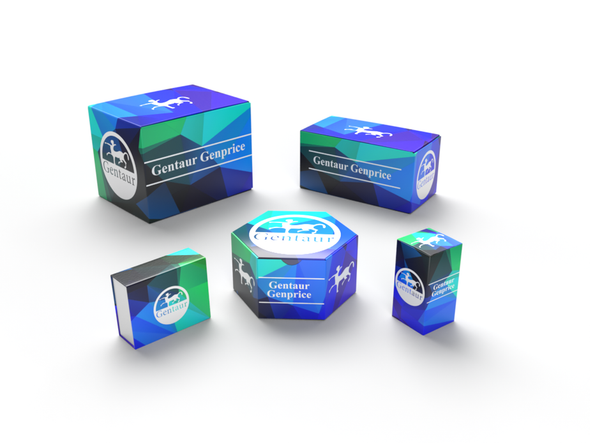749
Rat Prostaglandin-H2 D-isomerase (PTGDS) ELISA Kit | KTE100396
- SKU:
- 749-KTE100396
- Availability:
- Usually ships in 5 working days
Description
Rat Prostaglandin-H2 D-isomerase (PTGDS) ELISA Kit | KTE100396 | Gentaur UK, US & Europe Distribution
Application: This Rat Prostaglandin-H2 D-isomerase (PTGDS) ELISA Kit employs a two-site sandwich ELISA to quantitate PTGDS in samples. An antibody specific for PTGDS has been pre-coated onto a microplate. Standards and samples are pipetted into the wells and anyPTGDS present is bound by the immobilized antibody. After removing any unbound substances, a biotin-conjugated antibody specific for PTGDS is added to the wells. After washing, Streptavidin conjugated Horseradish Peroxidase (HRP) is added to the wells. Following a wash to remove any unbound avidin-enzyme reagent, a substrate solution is added to the wells and color develops in proportion to the amount of PTGDS bound in the initial step. The color development is stopped and the intensity of the color is measured.
Detection Method: Colorimetric
Conjugate: N/A
Sample Type: Cell culture supernatants#Serum#Plasma#Other biological fluids
Assay Type: Multiple steps standard sandwich ELISA assay with a working time of 3-5 hours. It depends on the experience of the operation person.
Kit Component: • Rat Prostaglandin-H2 D-isomerase microplate
• Rat Prostaglandin-H2 D-isomerase standard
• Rat Prostaglandin-H2 D-isomerase detect antibody
• Streptavidin-HRP
• Standard diluent
• Assay buffer
• HRP substrate
• Stop solution
• Wash buffer
• Plate covers
Features & Benefits: Rat Prostaglandin-H2 D-isomerase (PTGDS) ELISA Kit has high sensitivity and excellent specificity for detection of Rat PTGDS. No significant cross-reactivity or interference between Rat PTGDS and analogues was observed.
Calibration Range: Please inquire
Limit Of Detection: Please inquire
Usage Note: • Do not mix components from different kit lots or use reagents beyond the kit expiration date.
• Allow all reagents to warm to room temperature for at least 30 minutes before opening.
• Pre-rinse the pipet tip with reagent, use fresh pipet tips for each sample, standard and reagent to avoid contamination.
• Unused wells must be kept desiccated at 4 °C in the sealed bag provided.
• Mix Thoroughly is very important for the result. It is recommended using low frequency oscillator or slight hand shaking every 10 minutes.
• It is recommended that all samples and standards be assayed in duplicate or triplicate.
Storage Instruction: The unopened kit should be stored at 2 - 8°C. After opening, please store refer to protocols.
Shipping: Gel pack with blue ice.
Precaution The product listed herein is for research use only and is not intended for use in human or clinical diagnosis. Suggested applications of our products are not recommendations to use our products in violation of any patent or as a license. We cannot be responsible for patent infringements or other violations that may occur with the use of this product.
Background: Prostaglandin D synthase catalyzes the conversion of prostaglandin H2 (PGH2) to postaglandin D2 (PGD2) . Prostaglandin D synthase induces sleep, regulates nociception, inhibits platelet aggregation, and acts as an allergic mediator. Two distinct types of PGD synthase have been identified, namely the lipocalin type enzyme (b-trace) and the hematopoietic enzyme. Lipocalin type prostaglandin D synthase is localized in the central nervous system and male genital organs of various mammals and the human heart. This enzyme has been identified as b-trace, which is a major protein in human cerebrospinal fluid. Hematopoietic prostaglandin D synthase is widely distributed in the peripheral tissues and is localized in the antigen-presenting cells, mast cells, and megakaryocytes.
Alternative Names: PTGDS; RP11-229P13.6; L-PGDS; LPGDS; PDS; PGD2; PGDS; PGDS2; PGD2 synthase; beta-trace protein; glutathione-independent PGD synthase; lipocalin-type prostaglandin D synthase; prostaglandin D synthase; prostagla
Search name: PTGDS; RP11-229P13.6; L-PGDS; LPGDS; PDS; PGD2; PGDS; PGDS2; PGD2 synthase; beta-trace protein; glutathione-independent PGD synthase; lipocalin-type prostaglandin D synthase; prostaglandin D synthase; prostagla
Tag: PTGDS






